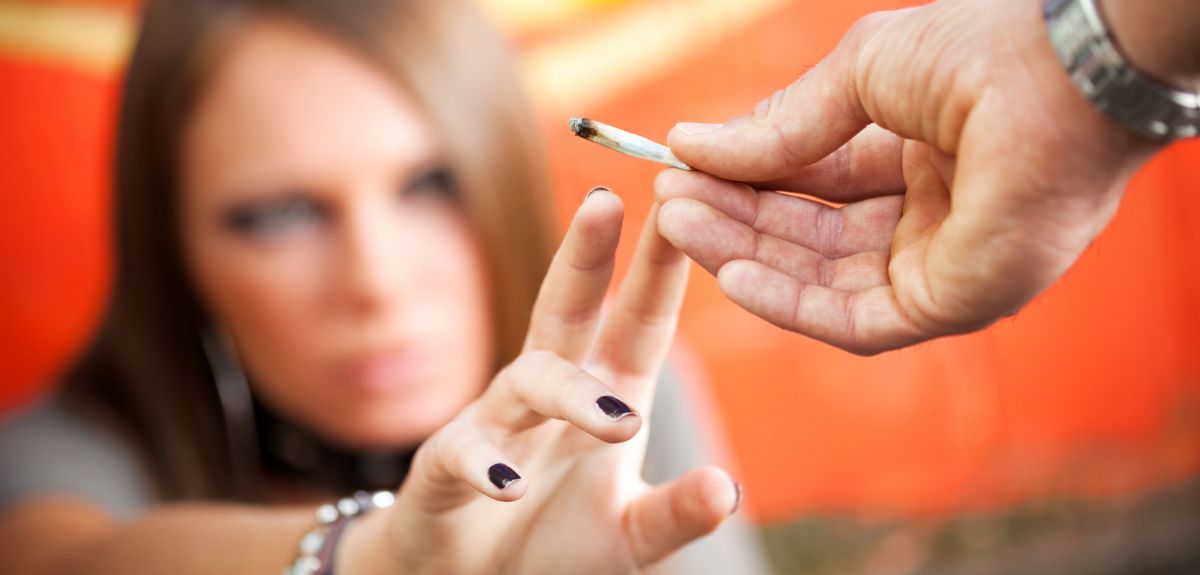
How cannabis causes paranoia
The largest study of the effects of the main ingredient of cannabis has shown definitively that it can cause short-term paranoia. The Oxford-led research also, for the first time, identifies psychological factors that can lead to feelings of paranoia in people who take cannabis.
The research team, led by Professor Daniel Freeman, found that worrying, low self-esteem, anxiety and experiencing a range of unsettling changes in perceptions most likely led to the feelings of paranoia.
'The study very convincingly shows that cannabis can cause short-term paranoia in some people,' says Professor Freeman. 'But more importantly it shines a light on the way our mind encourages paranoia. Paranoia is likely to occur when we are worried, think negatively about ourselves, and experience unsettling changes in our perceptions.'
The study, funded by the Medical Research Council (MRC), is the most in-depth investigation ever of the paranoia-inducing effects of the main psychoactive ingredient in cannabis, THC (Δ9-tetrahydrocannabinol). Participants were given a range of tests of excessive suspiciousness, including real-life social situations, a virtual reality simulation, self-report questionnaires and clinical interviews.
Paranoia is excessive thinking that other people are trying to harm us. Many people have a few paranoid thoughts, and a few people have many paranoid thoughts
Professor Daniel Freeman
All of those who took part had reported mistrustful thinking in their day to day lives. This is not an unusual sample as approximately half the population report similar paranoid type thoughts occurring in the past month. The scientists tested 121 participants between the ages of 21 and 50, all of whom had taken cannabis at least once before. None of the participants had a history of mental illness and all were screened to rule out relevant health conditions.
Two thirds of the participants were injected with the principal psychoactive constituent of cannabis and one-third were injected with a placebo. The dose was equivalent to a strong joint. The advantage of injection was that it reduces variability across participants in how much THC is in the bloodstream during testing, compared to oral or inhalation administration routes. In the study participants, the THC had effects for 90 minutes.
The study found that the main ingredient of cannabis increased the likelihood of paranoia occurring. Half the participants had paranoid thoughts with THC, and 30% with placebo. That is, 1 in 5 participants had an increase in paranoia directly attributable to the THC. The paranoia declined as the drug left the blood stream.
The drug also caused a range of other psychological effects: anxiety; worry; lowered mood; negative thoughts about the self; various changes in perception such as sounds being louder than normal and colours brighter; thoughts echoing; altered perception of time, and poorer short-term memory.
The Oxford researchers used a sophisticated statistical analysis which indicated that it was likely that the increase in the negative feelings and the perceptual changes led to the increase in paranoia. There was no indication that the reductions in short-term memory caused the increase in paranoia.
Professor Daniel Freeman of the Department of Psychiatry explains: 'Paranoia is excessive thinking that other people are trying to harm us. It's very common because in our day-to-day lives we have to weigh up whether to trust or mistrust, and when we get it wrong – that's paranoia. Many people have a few paranoid thoughts, and a few people have many paranoid thoughts.'
The researchers believe the study reinforces the idea that paranoia arises from multiple causes.
'The study identifies a number of highly plausible ways in which our mind promotes paranoid fears. Worry skews our view of the world and makes us focus on perceived threat,' says Professor Freeman. 'Thinking we are inferior means we feel vulnerable to harm. Just small differences in our perception can make us feel that something strange and even frightening is going on.'
He adds: 'The study provides a great deal more information about the immediate effects of cannabis, but it did not investigate clinically severe disorder. The results don’t necessarily have any implications for policing, the criminal justice system, or legislation. It tells us about the little discussed paranoid-type fears that run through the minds of so many people from time to time. The implication is that reducing time spent ruminating, being more confident in ourselves, and not catastrophizing when unusual perceptual disturbances occur will in all likelihood lessen paranoia.'
The study is reported in the journal Schizophrenia Bulletin. As well as funding from the MRC, it also received support from the National Institute for Health Research (NIHR) Biomedical Research Centre at South London and Maudsley NHS Foundation Trust and King's College London.
Source: MRC
 Statins do not cause the majority of side effects listed in package leaflets
Statins do not cause the majority of side effects listed in package leaflets
 Activism proves a stimulating topic at Sheldonian Series event
Activism proves a stimulating topic at Sheldonian Series event
 New Oxford-led initiative launches to train future leaders in transformative technologies for pharmaceutical research
New Oxford-led initiative launches to train future leaders in transformative technologies for pharmaceutical research
 Passengers cut down to size on virtual tube ride
Passengers cut down to size on virtual tube ride